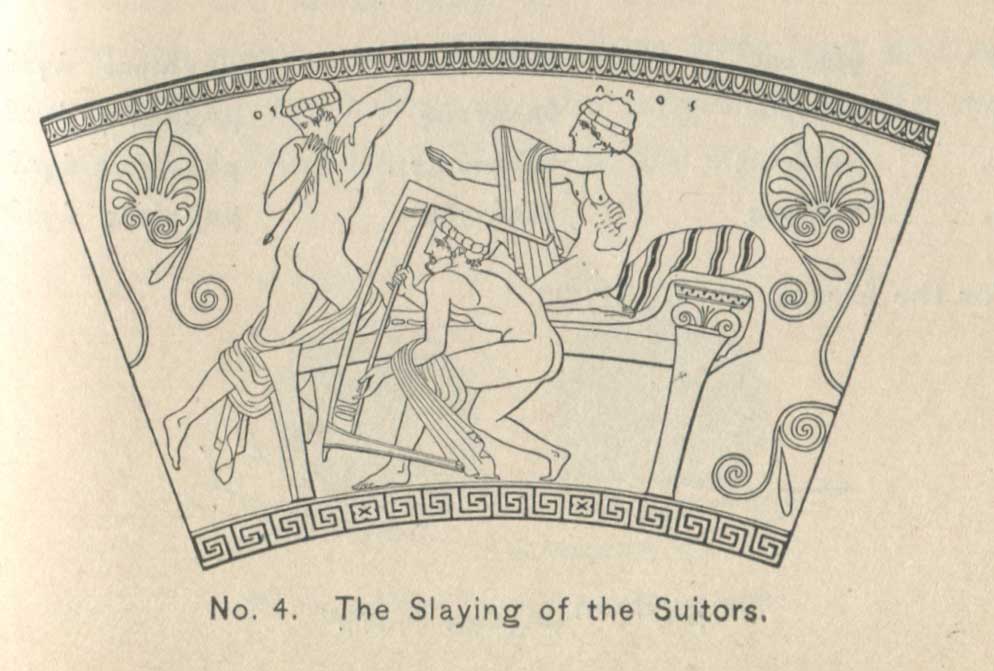THE FIRST GREEK BOOK
BY JOHN WILLIAMS WHITE, PH.D, LL.D., LITT.D.
Professor Of Ancient Greek At Harvard University
This Revision Copyright ©2012 by Shawn Irwin
Lesson V - Verbs . . . Introductory
S48. The Greek verb has three voices, the active, middle and passive.
S49. There are four Moods - the indicative, subjunctive, optative, and imperative. These are the finite moods. To them are added, in the conjugation of the verb, the infinitive and participles.
S50. There are seven Tenses - the present, imperfect, future, aorist, perfect, pluperfect, and future perfect. The present, future, perfect, and the future perfect indicative are called primary tenses; the imperfect, aorist, and pluperfect indicative are called secondary tenses.
S51. There are three Persons.
S52. There are three Numbers, as in nouns (31).
S53. The accent of verbs is recessive, i.e. it is thrown as far back as possible.
S54. The Stem of a verb is its fundamental part, from which its various tenses are formed.
The stem of λύω, loose, is λύ.
The stem of βουλεύω, plan, is βουλεύ.
The stem of πέμπω, send, is πέμπ.
S55. Paradigms - Present Indicative Active
|
SINGULAR |
PLURAL |
|
λύω, I loose |
λύομεν, we loose |
| λύεις, you loose |
λύετε, yous loose |
|
λύει, he looses |
λύουσι, they loose |
|
|
| DUAL |
|
|
λύετον the two loose |
|
|
λύετον |
|
|
SINGULAR |
PLURAL |
|
βουλεύω, I plan |
βουλεύομεν, we plan |
|
βουλεύεις, you plan |
βουλεύετε, yous plan |
|
βουλεύει, he plans |
βουλεύουσι, they plan |
|
|
| DUAL |
|
|
βουλεύετον the two plan |
|
|
βουλεύετον |
|
|
SINGULAR |
PLURAL |
|
πέμπω, I send |
πέμπομεν, we send |
|
πέμπεις, you send |
πέμπετε, yous send |
|
πέμπει, he sends |
πέμπουσι, they send |
|
|
| DUAL |
|
|
πέμπετον the two send |
|
|
πέμπετον |
|
|
SINGULAR |
PLURAL |
|
ἁρπάζω, I plunder |
ἁρπάζομεν, we plunder |
|
ἁρπάζεις, you plunder |
ἁρπάζετε, yous plunder |
|
ἁρπάζει, he plunders |
ἁρπάζουσι, they plunder |
|
|
| DUAL |
|
|
ἁρπάζετον the two loose |
|
|
ἁρπάζετον |
|
S56. Vocabulary
ἄγω, lead, carry, bring
ἁρπάζω, sieze, rob, plunder
βουλεύω, plan, plot
ἔχω, have, hold
λύω, loose, destroy, break
πέμπω, send
Ἑλληνικη, adjective, Greek
πύλη, ης, ἡ, gate
φυλακή, ης, ἡ, guard, garrison
ἐξ, (before vowel), ἐκ, (before a consonant), preposition with gen., out of, from (a proclitic).
οὐ, (before a consonant), οὐκ, (before a smooth breathing), ουχ, (before a rough breathing), adverb, not (a proclitic).
S57.
1. βουλεύει. 2. λύουσι.
3. ἔχεις. 4. πέμπεις.
5. ἔχετε. 6. βουλεύομεν.
7. ἅγω. 8. ἁρπάζει.
9. ἁρπάζετε. 10. πέμπουσι.
Answers:
1. He plans. 2. They destroy. 3. You have. 4. You send. 5. Yous have. 6. We plan. 7. I lead. 8. He siezes. 9. Yous sieze. 10. They send.
S58. Translate:
1. He plunders.
2. We lead.
3. They plan.
4. You send.
5. I loose.
Answers:
1. ἁρπάζει. 2. ἅγομεν.
3. βουλεύουσι. 4. πέμπεις.
5. λύω.
ο|ω ---------» 1st Per Sing I ---
εις ---------» 2nd per Sing you ---
ει|ειν ------» 3rd Per Sing s/he, it ---s
ομεν --------» 1st Per Pl we ---
ετε ---------» 2nd Per Pl yous ---
ουσι|ουσιν --» 3rd Per Pl they ---
S59.
1. ἄγω στρατιὰν Ἑλληνικήν.
2. τὰς καλὰς σκηνὰς λύουσι.
3. οὐχ ἁρπάζω τὰς κώμας.
4. τὴν φυλακὴν ἄγουσιν ἐκ τῶν σκηνῶν.
5. ἔχουσιν οἰκίας καλάς.
6. αἱ κῶμαι πύλας οὐκ ἔχουσιν.
7. οὐ πέμπομεν τὴν φυλακήν.
8. ἁρπάζετε τὴν χώραν.
9. ἐκ τῶν κωμῶν πέμπει τὴν στρατιάν.
10. ἐκ τῆς ἀγορᾶς ἄγεις τὴν Ἑλληνικὴν φυλακήν;
Answers:
1. I lead the Greek army. 2. The beautiful tents they destroy. 3. I do not sieze the villages. 4. The guard they lead out of
the tents.
5. They have homes beautiful. 6. Gates the villages they do not have. 7. We do not send the guard. 8. You all plunder the place.
9. Out of the villages he sends the army. 10. Out of the fields you lead the Hellenic guard.
S60.
1. Has he a Greek guard?
2. We are not destroying the gates.
3. I am sending the garrison.
4. You have a beautiful house.
5. He is not plundering the houses in the village.
Answers:
1. ἔχει Ἑλληνικὴ φυλακή; 2. οὐκ
λύομεν τὰς πύλας.
3. πέμπω τὴν φύλακήν. 4. ἔχεις οἰκὶα καλαί.
5. οὐκ ἁρπάζει τὰς οικίας ἐν τὴν κώμην.

End Of Chapter
INDEX
Chapter 6
HOME
This Revision Copyright ©2012 by Shawn Irwin
